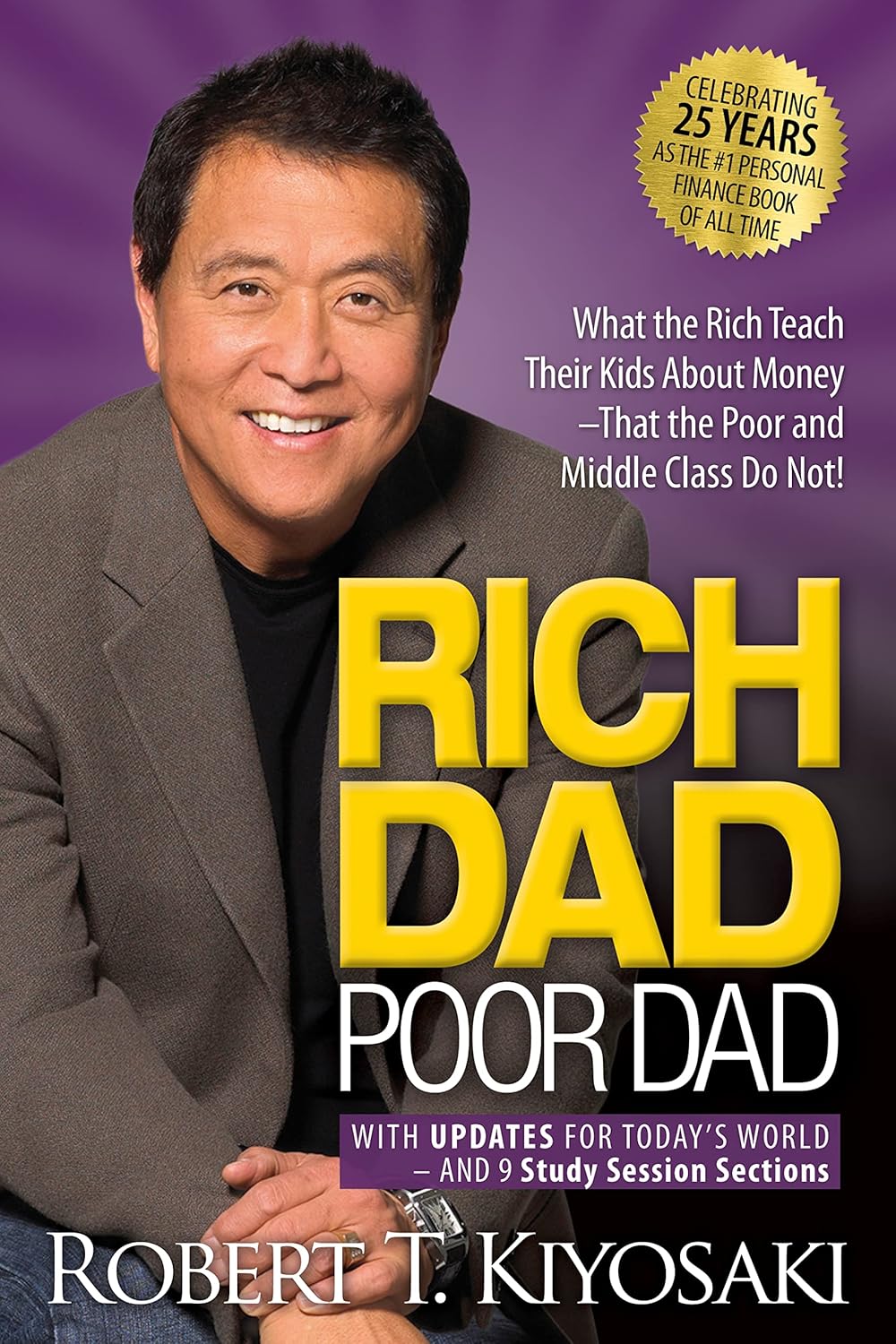Original Title
Rich Dad Poor Dad
Subject & College
Series
Publisher, Place
ISBN 13
978-1612681139
Language
English
Readers Feedback
Rich Dad Poor Dad
Review of "Rich Dad Poor Dad" by Robert T. Kiyosaki In today’s world, where financial struggles and debt dominate many lives, Rich Dad Poor Dad...Read More
Rajvansh Deshmukh
Rich Dad Poor Dad
Review of “Rich Dad Poor Dad” by Robert T. Kiyosaki
In today’s world, where financial struggles and debt dominate many lives, Rich Dad Poor
Dad by Robert T. Kiyosaki emerges as a powerful guide to transforming how we think about money. Published in 1997, this book remains as relevant and impactful today as it was at its inception. Kiyosaki uses the juxtaposition of two father figures in his life—his biological
father (Poor Dad) and his best friend’s father (Rich Dad)—to outline financial lessons that challenge traditional education systems and societal beliefs about wealth.
At its core, Rich Dad Poor Dad is about shifting one’s mindset. Poor Dad, an educated man who values formal education and a stable job, is the embodiment of society’s conventional wisdom: work hard, get a degree, secure a job, and save money for retirement. In contrast,
Rich Dad sees education in financial literacy, investing, and entrepreneurship as the real keys to building wealth and achieving financial independence. This dual perspective provides
readers with a comparative lens through which they can evaluate their own beliefs about money.
The book is divided into several lessons, each of which is a cornerstone in Kiyosaki’s philosophy of wealth-building. Some of the most important lessons include:
The Rich Don’t Work for Money
Kiyosaki introduces the idea that most people live in a perpetual cycle of earning and
spending, often called the “rat race.” He stresses the importance of understanding how to make money work for you by generating passive income through assets, rather than solely
depending on a salary. For instance, Rich Dad’s focus is on acquiring real estate, businesses, and other assets that generate income, rather than merely saving and relying on a single
paycheck.
It’s Not How Much Money You Make, But How Much You Keep
Financial literacy is at the heart of this principle. Kiyosaki emphasizes that earning a high income does not guarantee wealth. Many people who earn large salaries remain broke
because of poor money management and overspending. Understanding terms like “assets” and “liabilities” is key here. He simplifies this concept: assets put money in your pocket,
while liabilities take money out. A house, often considered an asset, can turn into a liability depending on how it is financed.
The Importance of Financial Education
The book critiques the education system for failing to teach children how to manage money. Schools teach us how to excel academically, but not how to grow our wealth or manage taxes effectively. Kiyosaki argues that financial education should be an integral part of the curriculum.
The Power of Taking Risks and Learning from Failures
Rich Dad emphasizes that wealth-building requires a mindset willing to take risks, learn from failures, and continue improving. Poor Dad avoids financial risks, choosing safety and
security. This distinction reflects the fears many people harbor about leaving secure jobs or
venturing into uncharted financial territory. However, Kiyosaki’s lessons are clear: calculated risks are often necessary for long-term success.
Kiyosaki also delves into other topics like entrepreneurship, real estate investing, stocks, and taxes. He challenges readers to rethink retirement, questioning the outdated models of
pensions and government-backed plans. His approach empowers readers to take control of their financial future rather than relying on traditional systems that may no longer be
sustainable in modern economies.
What makes Rich Dad Poor Dad truly impactful is its readability. Written in a conversational, almost anecdotal tone, the book breaks down complex financial concepts into simple terms. Kiyosaki’s narrative style makes it engaging for readers who may otherwise find topics like
accounting, investing, or finance daunting. Using personal experiences and parables, he creates an immersive reading experience that resonates deeply.
However, like any book, Rich Dad Poor Dad has its share of criticisms. One common critique is that the ideas presented in the book are sometimes oversimplified. For instance, while
Kiyosaki encourages investing in assets like real estate, he does not provide detailed
strategies or examples for beginners to follow. As a result, some readers may feel inspired by the book but unsure of how to implement the lessons in their lives. Additionally, critics have pointed out that Kiyosaki’s success stories rely heavily on real estate, which might not apply universally to all readers, particularly those living in economies or markets where real estate is less accessible.
Despite these shortcomings, the book succeeds in achieving what it sets out to do: changing the way people think about money. It motivates readers to become proactive in building
wealth and taking ownership of their financial journeys. Rich Dad Poor Dad is not a step-by- step guide but rather a mindset manual—a way of thinking that prioritizes financial literacy, entrepreneurship, and long-term planning.
Who should read this book? In short, everyone. It is especially powerful for young adults,
college students, and those just starting their careers. Kiyosaki’s lessons encourage readers to move beyond the outdated model of relying on job security and toward building a future of
financial freedom. For individuals stuck in the nine-to-five grind, the book serves as a wake- up call to reevaluate their financial choices and consider new opportunities.
In conclusion, Rich Dad Poor Dad is more than a personal finance book—it’s a life
philosophy. Kiyosaki offers readers the tools to challenge societal norms about money and seek financial independence through education, investing, and bold thinking. While it may lack granular details or fail to address every situation comprehensively, its motivational
message has stood the test of time. For anyone looking to break free from financial
limitations and reshape their future, Rich Dad Poor Dad is an essential read. This book doesn’t just change your thoughts about money; it changes your relationship with it.

